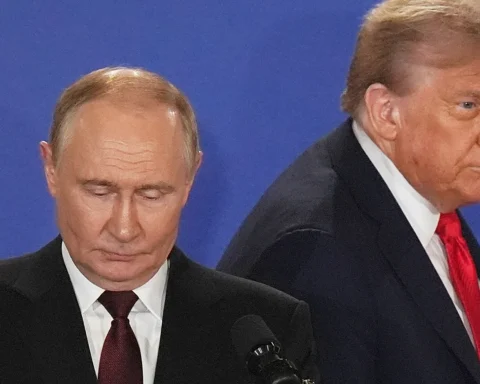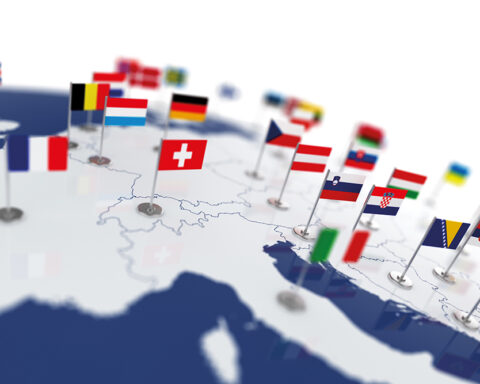France’s recent elections all had surprises, but each time the contest’s basic structure was still foreseeable. That isn’t the case now.
France’s 2027 presidential race is wide open.
The country’s last five or six elections all had surprises and plot twists, but each time the contest’s basic structure was still foreseeable two years ahead of time. That isn’t the case now.
There are several reasons for this: A generalized mood of discontent with politics; the scrambling of the old left-right divide; the weakness of the incumbent president, who can neither run again nor readily influence the choice of his successor; as well as the global, economic and political uncertainties generated by the administration of U.S. President Donald Trump.
Moreover, the choice of candidates is particularly uncertain this time around, as President Emmanuel Macron’s center is hugely fragmented.
Until last month, the competition to succeed Macron was limited to two of his former prime ministers: the leader of the center-right Horizons party, Edouard Philippe, and the leader of Macron’s Renaissance party, Gabriel Attal. But now, both have fallen out with the president and are attempting to appeal to his socially progressive, pro-European, pro-business base, while simultaneously distancing themselves from an unpopular president with a patchy record.
Polls indicate that Philippe is a clear early leader in this battle for the center, with 21 to 24 percent support in the first round of the election, while Attal’s polling is around 14 to 15 percent. All the while, hard-line Minister of the Interior Bruno Retailleau’s bid threatens to turn the “central civil war” into a three-way fight.
As head of the much weakened ex-Gaullist center-right party Republicans, Retailleau seems certain to become his party’s candidate, which sets up three of the four party leaders in the governing alliance as rivals to be Macron’s successor — an inherently explosive situation.
The French president has lost almost all domestic influence since his unsuccessful snap elections last year, and he has little leverage to influence this crucial race within a race. Moreover, both Philippe and Retailleau are unlikely to campaign to “save Macronism” but rather to bury it and restore something closer to the socially conservative, economically liberal and less enthusiastically European center right of former presidents Jacques Chirac or Nicolas Sarkozy.
On the left, the stage is even more crowded. The perennial hard-left candidate Jean-Luc Mélenchon is showing at 13 to 15 percent in early first-round polling despite his status as the most disliked man in French politics, with negatives of over 70 percent. As always, his undeclared but likely presence in the race will make it difficult for a broad-left candidate to emerge.
Still, the strongest early contender on the moderate, pro-European left is Raphaël Glucksmann — a member of the European Parliament who performed surprisingly well in the 2024 European elections and is currently polling at 10 to 11 percent. Both Glucksmann and Mélenchon have ruled out participating in any pan-left primary contest.
Meanwhile, the once powerful center-left Socialist Party remains split between its radical and reformist, pro-European wings. Narrowly retaining his seat for a fourth time, the party’s left-leaning First Secretary Olivier Faure hopes to be its presidential candidate for 2027. However, at least two rising figures from the party’s moderate wing — Carole Dega, president of the southwest Occitanie region, and Karim Boumrane, mayor of Saint-Ouen in the Paris suburbs — plan to oppose him.
So, overall, it looks like there will probably be up to eight left-wing candidates in the presidential race by the end of next year.
For the far right, being in pole position doesn’t necessarily translate to victory either, though.
Polling numbers remain strong for the National Rally party despite the March court verdict banning opposition leader Marine Le Pen from seeking office for five years. All recent surveys show Le Pen and her deputy, Jordan Bardella, boasting over 30 percent of first-round support. And if confirmed in April 2027, either of them would be in pole position to win the runoff the following month — but that’s still no guarantee.
Both Le Pen and Bardella have very high negatives — in the range of 47 to 49 percent — which would make it exceedingly hard for them to assemble the 50 percent of the vote needed to prevail.
Relations between the two have also deteriorated since the court ruling. Le Pen, who still regards herself as the National Rally’s candidate until next year’s appeal, has been angered by suggestions — from both the Bardella camp and the media — that he’s now the true presidential frontrunner, pointing out his youth and lack of experience on several occasions. So far, however, these tensions haven’t reduced their joint popularity in the polls.
Of course, this far out from the 2027 race, opinion polls for the second round are rare; however, several recent Ifop and Odoxa surveys suggest that Philippe would beat both Le Pen and Bardella, while they might defeat Retailleau or Attal. The outcome will, therefore, depend on who snatches second place in the first round — something that might be decided by a slim margin of just a few thousand votes if the center and left-wing candidates remain neck-and-neck to the finish line.
Simply put, Macron has a succession problem — and there’s not much time to solve it.
* Mujtaba Rahman is the head of Eurasia Group’s Europe practice. He tweets at @Mij_Europe.
Source: https://www.politico.eu/article/emmanuel-macron-presidential-race-2027-succession-france-eu/






